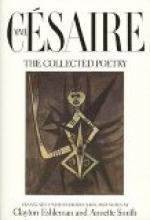|
This section contains 13,016 words (approx. 44 pages at 300 words per page) |

|
SOURCE: Nesbitt, Nick. “Cannibalizing Hegel: Decolonization and European Theory in La tragédie du roi Christophe.” In Voicing Memory: History and Subjectivity in French Caribbean Literature, pp. 118-44. Charlottesville: University of Virginia Press, 2003.
In the following essay, Nesbitt investigates the influence of G. W. F. Hegel's dialectical historicism on Césaire's work, particularly The Tragedy of King Christophe.
Human history, the history of the progressing mastery of nature, continues the unconscious history of nature, of devouring and being devoured.
—Theodor W. Adorno
In his aesthetic works of the late 1950s and early 1960s, Aimé Césaire increasingly objectified both the historical process of decolonization and the complex role to be played by the prophetic intellectual, the “griot of his people.” To do so, he drew upon a vast range of intellectual materials at his disposal, the most striking of which was the Hegelian model of dialectical historicism. C...
|
This section contains 13,016 words (approx. 44 pages at 300 words per page) |

|


